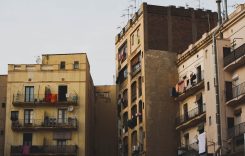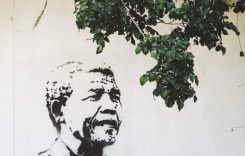The Nobel Peace Prize will be awarded to the Ethiopian Prime Minister in Oslo on 10 December for his work in reconciliation with the Eritrean neighbour. But for many observers, it means forgetting that his country has never been so affected by ethnic conflicts.
Dinner is held under the marquetry of the huge banquet hall of Menelik II Palace. Five hundred guests, almost as many waiters in black suits, all that the Horn of Africa has of personalities – the presidents of Kenya, Uganda, South Sudan, Somalia, dozens of ministers, ambassadors by the bucket, United Nations officials… They came to celebrate the renovation and public opening of the Gebi that Emperor Menelik II, Ethiopia’s “father”, had built on the heights of Addis Ababa in 1886, and which has since become the official residence of the country’s leaders. Six months of hard work by a team from the United Arab Emirates has brought the palace back to a brand new state.
“Before, we were barely allowed to turn our heads when we drove past,” says Tamarate Haile, the man in charge of the 40 hectares of buildings and gardens renamed “Unity Park”. It is now available for 400 Birr (12 euros). Abiy Ahmed, the new Prime Minister, wants the Ethiopians to reclaim the glorious past of their country three thousand years old, occupied only five years by Mussolini’s Italy, and rich in a writing tradition since the fourth century.
In the trap of identity claims
On the evening of 10 October 2019, everyone is talking only about the dynamism of “Abiy”, which has begun the democratization of the country, signed a peace agreement with the Eritrean enemy after 20 years of conflict and is on the short list of the Nobel Peace Prize. It was while watching television with his advisers the next morning, under the flashes of the personal photographer who almost never leaves him, that Abiy Ahmed learned that he was the lucky winner. And that’s when the trouble multiplied. Eloi Ficquet, lecturer at the Ecole des Hautes Etudes en Sciences sociales (EHESS), notes:
“The Norwegian Nobel Committee has shown short-sightedness. He was seduced by an oiled communication and an image of a good student of the class on the international scene. »
When he was appointed in April 2018 by the Ethiopian People’s Revolutionary Democratic Front (EPRDF), which holds the country in an iron fist, Abiy Ahmed was seen as the messiah. After seventeen years of “red terror” under the military dictatorship of Mengistu Haile Mariam and twenty-seven years of authoritarian rule with the EPRDF – including three years of bloody ethnic protests and violence – the country is on the brink of collapse. A wave of “abiymania” is breaking out over Ethiopia.
Stickers on the windscreens of Addis Ababa taxis, posters on the front of the shops of Merkato, the market in the west of the city… At the end of June, hundreds of thousands converged on the capital to attend Meskel Square, Abiy Ahmed’s first public speech.
Today, the celebration is over. The photographer sent by AFP to capture the scenes of jubilation in the streets of Addis Ababa after the Nobel Prize announcement left empty-handed. The congratulatory posters can be counted on the fingers of one hand (one on the facade of the Korean hospital, the “Myungsung Christian Medical Center”, another at the entrance of the American embassy, one, again, on Meskel Square, withdrawn after a few weeks…). A year and a half was enough for Abiy Ahmed to be caught in the trap of the identity claims of the 80 ethnic groups and 105 million inhabitants of this boiling country. A pressure cooker.
“A great breath of freedom at first”
For Befeqadu Hailu Techanie, 39, writer and co-founder of the activist blog Zone 9, who spent 18 months in prison and was tortured by men from Haile Mariam Dessalegn, the former Prime Minister (2012-2018), “there was a great breath of freedom at first”:
“Abiy lifted the state of emergency, freed thousands of prisoners, closed Maekelawi prison. It has also made it possible, by signing peace with Eritrea, for thousands of families, separated for twenty years, to finally meet again. »
At 42 years old – he is the youngest African leader in office – the son of a Muslim Oromo and a Christian Amhara, this polyglot, who speaks English, Amharic, Afaan Oromo and Tigrigna, makes Ethiopians dizzy with his first months of reforms. He appointed a joint government (the only one in Africa with Rwanda), promoted women to the presidency of the Republic and the Supreme Court, decided to liberalize a state economy with the privatization of public giants like Ethio Telecom.
A stroke of white has passed on the walls of his offices, the old furniture of the 1970s is exchanged for clear furniture with all the latest design. Its communicators open Twitter accounts and Facebook pages, you name it. Abiy hugging Eritrean President Isaias Afeworki on the tarmac of Addis-Adeba airport, making pumps with red berets who tried to force his safety, Abiy driving a truck on a building site in the capital, dressed as a gardener for the day of planting 350 million trees…
Peace, justice, forgiveness, reconciliation. The speeches of this member of the Evangelical Church Full Gospel Believers, which has 7 million followers in Ethiopia and practices collective exorcism sessions, are full of biblical references.
A hundred deaths every month
“He still has an image as a peacemaker and unifier abroad, where he is very often,” says activist Abel Wabella, another co-founder of Zone 9, now in charge of the Addis Zeybe news website, “but he has proven unable to ensure security in his own country. »
Ethnic violence, once calmer, has returned to normal. In the Oromo provinces, but also in the regions of Amhara, Afar, Somali… IDPs reach the world record of 3 million, according to UN agencies, and an average of 100 deaths are recorded every month. The peace process with Eritrea is at a standstill, the border has been closed. Researcher René Lefort summarizes:
“The situation has become incredibly complex and dangerous. The shadow of a Yugoslavian scenario hovers over us. »
The most worrying violence broke out some ten days after the announcement of the Nobel Prize. A few words posted on social networks on the night of October 22nd were enough to set the country on fire. The signatory is a 33-year-old Oromo activist, Jawar Mohammed, head of the YouTube channel, Oromia Media Network, who has returned home after 15 years in the United States. First of all, he supported Abiy Ahmed, the first representative of the Oromo community (35% of the population) at the head of the country after decades of power in the hands of the Tigray, despite being a minority, and is now his fiercest opponent.
The “post” on Facebook where he denounced the government’s suppression of his guards caused three days of violence, particularly in Addis Ababa and Adama, and caused 86 deaths. He avoids going out into the city and receives in a dark office – curtains systematically drawn -, cluttered with portraits of the heroes of the Oromo cause, on the ground floor of a marble villa, where one can access through a security airlock and a body search. For him, in Ethiopia, “the only possible option is federalism, with equitable representation for each group”. He decided to stand for the next parliamentary elections, if they are held, in May 2020.
Supported by the international community
Jawar Mohammed-style hard federalism versus Abiy Ahmed-style soft federalism? Since the 1995 Constitution, Ethiopia has been a federal state based on ethnolinguistic or regional affiliations. A zealous servant of power until now (he was a deputy from his native region, a former Minister of Science and Technology, but also a “man” of intelligence and surveillance), the Prime Minister wants to launch “his” party, the Ethiopian Prosperity Party (EPP), on the basis of the old EPRDF, and seems isolated in an increasingly personal power.
He knows that he is supported by the international community, led by the United States and the Gulf countries. No one wants to see the second most populous country on the continent fall into chaos. Ethiopia is an African “dragon” with one of the highest growth rates in the world in ten years and raises all hopes. “But the problem is that Abiy may no longer be in power next year,” says a British diplomat. He got the Nobel Prize too soon… or too late. »
Even the “Unity Park”, “its” construction site, supposed to embody “pan-Ethiopism”, has become a source of conflict. The Oromos, but also the Somalis and the peoples of the South, are standing up against the honours thus given to an emperor whom they perceive as a tyrant. “He conquered, slaughtered, oppressed. For us, it’s Hitler, Mussolini,” says Jawar Mohammed. On social networks, calls to ransack Menelik II’s statue near St. George’s Cathedral and boycott his palace are spreading like wildfire.










